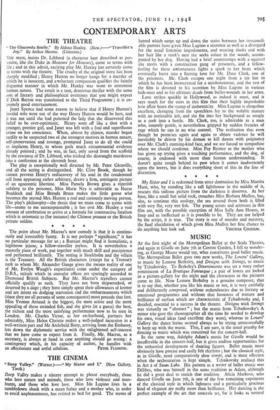CONTEMPORARY ARTS
THE THEATRE
You must, insists Dr. Libbard (a character best described as per- vasive, like the Duke in Measure for Measure), come to terms with life ; and in this adroit, exciting play Mr. Huxley has certainly come to terms with the theatre. The cruelty of the original story has been sharply modified ; Henry Hutton no longer hangs for a murder of which he is innocent, and a-reluctant compassion qualifies the faintly disgusted manner in which Mr. Huxley was wont to anatomise human nature. The result is a taut, dexterous thriller with the same sort of literary and philosophical overtones that you might expect if Dick Barton was transferred to the Third Programme ; it is ex- tremely good entertainment.
Janet Spence had some reason to believe that if Henry Hutton's invalid wife were out of the way Henry Hutton would be hers, and it was not until she had poisoned the lady that she discovered this belief to be over-optimistic. Henry went off like a shot with a younger, prettier girl, and Janet was left with a foul and superfluous crime on her conscience. When, almost by chance, murder began tardily to be suspected two of the strongest motives in human nature, self-preservation and revenge, prompted Janet to do all she could to implicate. Henry, to whose guilt much circumstantial evidence already pointed ; and he was, in fact, only saved from the scaffold by the resource of Dr. Libbard, who tricked the distraught murderess into a confession at the eleventh hour.
The play is exceptionally well directed by Mr. Peter Glenville, and all the acting is distinguished. Mr. Clive Brook, though he cannot prevent Henry's rediscovery of his soul in the condemned cell from appearing rather arbitrary, draws a firm, astringent picture of an egocentric libertine. Miss Pamela Brown gives a viperish subtlety to the poisoner, Miss Marie Ney is admirable as Nurse Braddock and Miss Brenda Bruce makes the little goose who becomes the second Mrs. Hutton a real and curiously moving person. The play's philosophy—the thesis that we must come to terms with life—seems to me unexceptionable; it has cost Mr. Huxley a vast amount of cerebration to arrive at aformula for constructive fatalism which is axiomatic to (for instance) the Chinese peasant or the British private soldier.
* * * * The point about Mr. Macrae's new comedy is that it is continu- ously and irresistibly funny. It is not perhaps " significant," it has no particular message for us ; a Russian might find it formalistic, a highbrow jejune, a fellow-traveller joyless. It is nevertheless a masterly piece of work, put together with much skill and percipience and performed brilliantly. The setting is Stockholm and the villain is the Treasury. All the British characters (except for a Treasury nark to whom Mr. Alexander Gauge gives the rococo reality of one of Mr. Evelyn Waugh's expatriates) come under the category of D.B.S., initials which in consular offices are sparingly accorded to Distressed British Subjects. But Mr. Macrae's travellers cannot officially qualify as such. They have not been shipwrecked, or deserted by a dago ; they have simply spent their allowances of kroner and are intent on dodging starvation and the embarrassments which (since they are all persons of some consequence) must precede that fate. Miss Yvonne Arnaud is the biggest, the most active and the most appealing of these stranded fish, and she gives (at a guess) the best, the richest and the most satisfying performance now to be seen in London. Mr. Charles Victor, as her ex-husband, partners her admirably, Miss Helen Christie makes a well-judged incursion in a well-written part and Mr Archibald Batty, arriving from the Embassy, lets down the diplomatic service with the enlightened self-interest that we have come to expect from it. Finally, Mr. Macrae, as a secretary, is always at hand in case anything should go wrong : a contingency which, in his capacity of author, he handles with






























 Previous page
Previous page